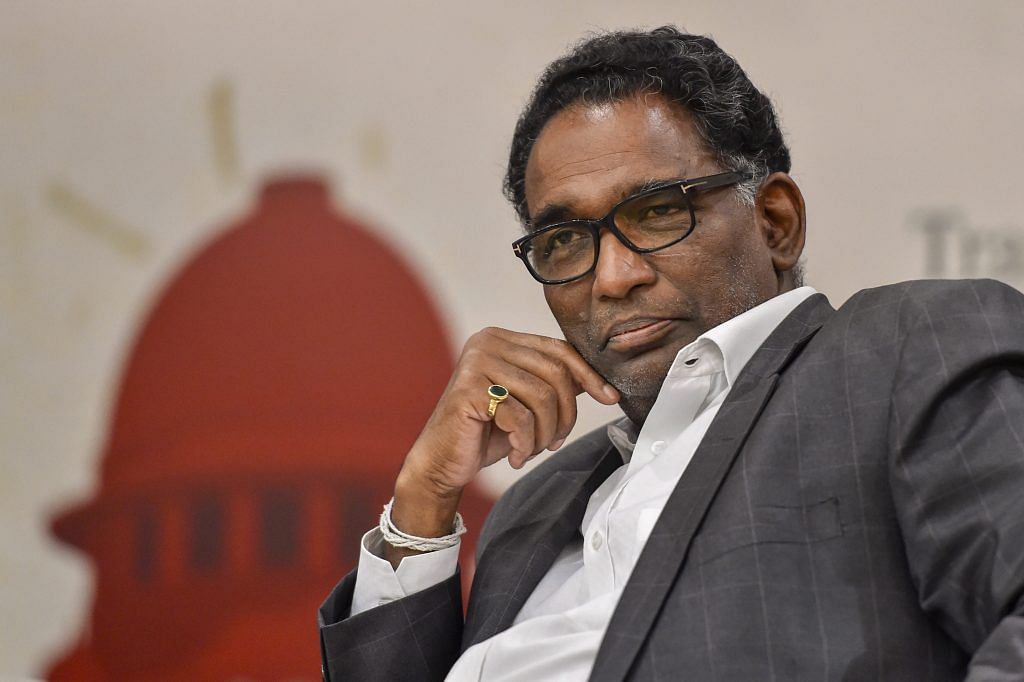New Delhi: The Supreme Court did not follow due process when handling the sexual harassment allegations against Chief Justice of India (CJI) Ranjan Gogoi, Justice Jasti Chelameswar, a retired judge of the court, told ThePrint Wednesday.
Chelameswar is the second retired judge of the top court to publicly question the procedure followed in the case that has shaken the higher judiciary.
Justice Madan B. Lokur (retd) had expressed similar reservations in an opinion piece he wrote in The Indian Express Wednesday.
The two were among the four judges — the others being Justice Gogoi and Justice Kurian Joseph — who triggered a crisis in the Indian judiciary in January 2018 when they held a press conference to publicly raise concerns about the handling of cases under then-CJI Dipak Misra.
Saying that he is perturbed by the “systematic failure” in the judiciary, Chelameswar, who was the second most senior judge in the Supreme Court when he retired, told ThePrint that “no one is above the law, at least not in my opinion, and hence I don’t see why the procedure for this case should be any different from the law of the land”.
“I wouldn’t want to comment on individuals at this stage since we don’t know whether the allegations are true or false,” he said. “But it is about the system and the procedure adopted that I am concerned about.”
Also read: Is Supreme Court handling sexual harassment allegation against CJI Ranjan Gogoi correctly?
An unprecedented crisis
The Indian judiciary has been facing one of its toughest crises since a former Supreme Court employee alleged in a letter to the court’s 22 judges last month that CJI Gogoi had sexually harassed her while she was working at his home office.
She claimed that a campaign had been launched to victimise her after she spurned his advances, saying she and a brother-in-law were fired from the court, while her husband and another brother-in-law lost their jobs with the Delhi Police.
In a controversial decision, the next day, 20 April, a Saturday, the CJI had presided over a hearing on the matter. At the hearing, he described the allegations as the handiwork of a “bigger force” that wanted to “deactivate the CJI’s office”.
The allegations were subsequently taken up by an in-house committee of the court, which said in its report that it had found no substance in the woman’s claims.
The controversy has only intensified since as the in-house panel — comprising Justices S.A. Bobde, Indu Malhotra, and Indira Banerjee — refused to give a copy of its report to the complainant.
This decision, which was attributed to a legal precedent from 2003, was among the issues questioned by Lokur in his opinion piece.
Chelameswar said concerns about the woman not being given a copy of the report were valid, adding that she had “complete right” to ask for a support person or lawyer to be present if she felt uncomfortable during the proceedings.
While the panel was discussing the case, the woman had been denied permission to bring a lawyer or support person, following which she had recused herself from the proceedings.
Referring to the CJI being the presiding judge for the special hearing on 20 April, Chelameswar added, “It is like the medical college scam last year. I see the same process is being followed this time too.”
The “medical college scam” is another episode that triggered considerable tumult in the judiciary. On 19 September 2017, the CBI had registered an FIR, claiming that attempts had been made to manipulate the Supreme Court’s proceedings to obtain permissions in favour of a medical college run by the Lucknow-based Prasad Education Trust. It named former Odisha High Court judge I.M. Quddusi as an accused.
Activists subsequently moved petitions in the top court, seeking an independent inquiry into the matter. The petitions were mentioned before a bench headed by Justice J. Chelameswar, who was then the second most senior judge, as the then CJI Dipak Misra was presiding over a Constitution bench.
Chelameswar sought the formation of a five-judge bench to deal with the petitions. The next day, following an order from a two-judge bench handling a similar petition, a Constitution bench was quickly put together to nullify the orders of Chelameswar’s bench. In the process, the power of the CJI as master of the roster was asserted. The petitions were dismissed.
Also read: Shattered, dejected, says woman who complained against CJI Gogoi after his clean chit
Speaking up
The CJI Gogoi row sparked several calls from the legal fraternity and activists for retired judges of the Supreme Court to speak up.
https://twitter.com/ijaising/status/1131023361524477952?s=12
Chelameswar said it was “good that they are speaking up”, but added, “Where were these people when me and three of my colleagues raised our concerns at a press conference last year?”
“If only they had spoken up well in time, we could have avoided such a situation wherein everyone is pointing fingers towards the due process,” he added.
He also weighed in on Finance Minister Arun Jaitley’s 20 April blog about the CJI Gogoi row, where he had said that “It’s Time To Stand Up With Judiciary” and questioned the “unverified allegations” made by a “disgruntled person with a not-so-glorious track record”.
“When we raised pertinent issues last year about the functioning of the Supreme Court, the government said it was an internal matter of the apex court. However, we have union ministers who are now willing to come to the rescue or defend the institution…” said Chelameswar. “Why the double face?”
